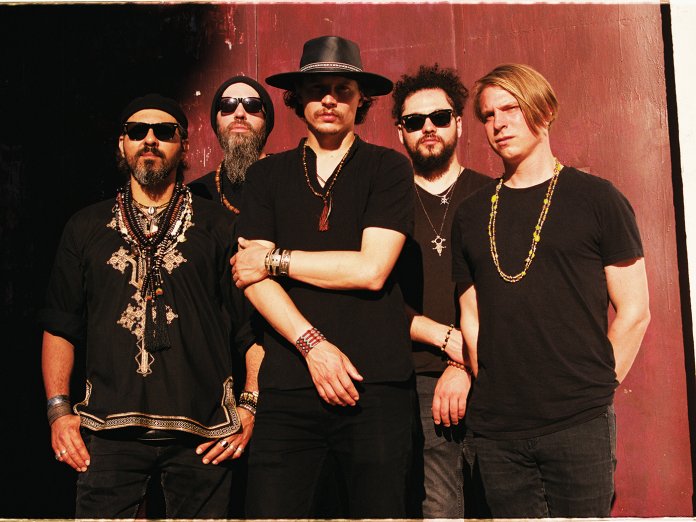Enlisting radical US veterans Lee Ranaldo and Jello Biafra, alongside the rising generation of rebel poets, political exiles and roots-rock revolutionaries forged during the Arab Spring, polyglot Parisians Al-Qasar whip up a globalised psych-rock storm on this gutsy debut. The band bill their self-s...
Enlisting radical US veterans Lee Ranaldo and Jello Biafra, alongside the rising generation of rebel poets, political exiles and roots-rock revolutionaries forged during the Arab Spring, polyglot Parisians Al-Qasar whip up a globalised psych-rock storm on this gutsy debut. The band bill their self-styled “Arabian Fuzz” sound as an authentic snapshot of multicultural Paris in 2022: this loosely translates as an agreeably grimy mongrelised mixtape of punk, grunge and garage-rock signifiers interwoven with gnawa, rai and desert blues influences, all overlaid with Arabic and Berber-language lyrics.
Al-Qasar were formed by guitarist and oud player Thomas Attar Bellier, a veteran of various psych and prog-metal bands, and sometime collaborator with feted Middle Eastern artists like Emel Mathlouthi. The project began as a more fluid collective featuring Bellier alongside various friends, mostly poets from the Arab world. They recorded their first EP, Miraj, in Cairo. But as this debut album began to take shape, the lineup solidified into a more traditional rock group based in Paris, fronted by Moroccan vocalist Jaouad El Garouge. Both live and on record, Al-Qasar present as a fairly conservative set-up with drums, bass, guitars, leather jackets, sunglasses and wild facial hair. But there are more experimental post-rock drones and avant-metal textures buried in the mix too, amd a rich array of Middle Eastern and North African instruments like the electric saz, bendir, darbuka and sagat.
Al-Qasar’s earliest rehearsals and live shows took place in Barbès, a grungy, un-gentrified, historically Arab district of Paris. Indeed, they pay tongue-in-cheek tribute to the area here with the doomy, propulsive, swampy track “Barbès Barbès”. Rich in theatrical drama and ironic humour, this lyrical paean to low-rent lives and illicit parties also features feted Franco-Algerian oud player Mehdi Haddab of Speed Caravan fame, whose long list of previous collaborators include legendary rai icon Rachid Taha and Damon Albarn’s Africa Express collective.
Bellier initially contacted Ranaldo through mutual friends with the idea of recording together in Sonic Youth’s New York studio, but Covid got in the way. Instead, the veteran guitar-mangler sent over a mountain of treatments, which feed onto two of the album’s stand-outs. The short opening instrumental “Awtar Al Sharq” is a mood-setting swirl of plucked strings, drones and stormy clatter. But the more muscular, expansive “Awal” is a full-blooded set-piece anthem, with an incantatory Arabic lyric that builds from guttural growl to siren howl, its propulsive overdriven rhythm sounding almost like a Franco-Maghrebian variant of krautrock.
Bellier’s connections to US punk godfather Jello Biafra, as a former member of his sometime backing band Spindrift, also pay off here with “Ya Malak”, a coldly furious rant against political corruption and social inequality laid over a punchy, percussive tangle of strings, drums and strings. Initially sounding fuzzy and remote, then boomingly close, Biafra’s signature blowtorch scorn makes a good match for the spoken-word lyric by Egyptian revolutionary poet Ahmed Fouad Negm, an auspicious vehicle for his debut English translation. “Who are they and who are we?” Biafra howls. “They are the emirs and they are the sultans… they wear the latest fashions, but we live seven in a single room”.
Although Who Are We? is a fairly testosterone-heavy affair, several of the strongest tracks are driven by female vocalists and feminist-slanted messages. Outwardly a romantic song, the percussive, kinetic, feverish “Hobek Thawrat” features Sudanese-American siren Alsarah – aka Sarah Mohamed Abunama-Elgadi, the daughter of political exiles and human rights activists – who clothes her call for revolution back home in the wily ambiguous language of love poetry. Meanwhile, mighty closer “Mal Wa Jamal” showcases Egyptian vocalist Hend Elrawy, who paints an empathetic portrait of sex workers over a bass-throbbing, string-plucking, centrifugal racket that invokes Primal Scream in their future-punk prime.
In places, Al-Qasar still sound like the embryonic work in progress that they are, while Who Are We? is sometimes let down by its oddly staid faith in the bludgeoning moral force of declamatory, sloganeering urchin-rock. Alien beauty, pop glamour and wild new sonic horizons can also be revolutionary voices for change. But there is a healthy spread of sense-rupturing potential and exhilarating skronk here, from the petrochemical protest anthem “Benzine” to the funky, discordant instrumental “Sham System”. Bellier and his gang are not reinventing the wheel, but they are making a potent racket with gusto, passion and cool outlaw swagger.



